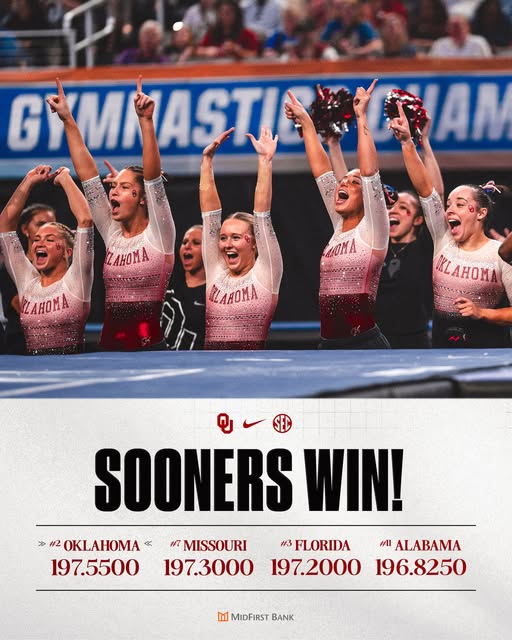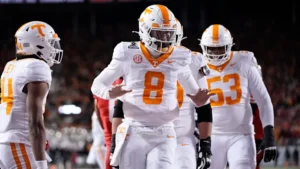
Oklahoma Sooners: Winning Is Our Culture
The University of Oklahoma (OU) Sooners have long been a symbol of success in college athletics, and their football program stands as one of the most storied in American sports history. From their humble beginnings to their emergence as a powerhouse of the sport, the Sooners have consistently been a force to be reckoned with. The phrase “Winning is our culture” encapsulates not just a slogan, but a deep-rooted philosophy that has defined the team and its supporters for over a century. This motto reflects the relentless pursuit of excellence, the unyielding will to succeed, and the belief that victory is ingrained in every aspect of their program.
The Early Years: Laying the Foundation
The origins of the Oklahoma Sooners football program trace back to 1895, when the university first established a football team. While their early years were marked by sporadic success, it wasn’t until the 1940s that the Sooners began to develop a reputation for dominance. The foundation for this culture of winning was laid by legendary coaches such as Bud Wilkinson, whose tenure from 1947 to 1963 set the stage for OU’s future success.
Wilkinson revolutionized the program and, more importantly, made Oklahoma synonymous with football excellence. His most notable achievement came in the 1950s when he led the Sooners to a 47-game winning streak, a feat that remains one of the most remarkable achievements in the history of college football. This streak was not just about victories; it represented the mindset and the level of consistency that Oklahoma football would become known for. Winning became more than just an occasional outcome—it became expected.
The 1980s: A Return to Glory
After a brief period of stagnation in the 1960s and 1970s, the Sooners rebounded in the 1980s under the leadership of head coach Barry Switzer. Switzer inherited a team with immense potential, and he quickly harnessed that talent to bring Oklahoma back to national prominence. Under his leadership, the Sooners won three national championships (1974, 1975, and 1985) and became known for their explosive offense and aggressive defense.
Switzer’s success was not only about strategy and execution; it was about instilling a winning mindset within his players. The Sooners’ dominant performances on the field were a reflection of a larger cultural shift in the program. Switzer’s approach to coaching was rooted in creating a team-first mentality, one where the goal was always to win, regardless of the circumstances. His teams embraced the idea that winning was not just about talent, but about outworking opponents and persevering through adversity.
The 2000 National Championship: A Modern-Day Triumph
While the Sooners had enjoyed intermittent success in the 1990s, it wasn’t until the early 2000s that the team truly reestablished itself as an elite program. Under the leadership of head coach Bob Stoops, Oklahoma reached new heights in the 2000s, culminating in a national championship victory in 2000. Stoops’ arrival at OU in 1999 was the catalyst for a complete overhaul of the program’s culture. He instilled a sense of discipline, urgency, and self-belief that had been lacking in previous years.
The 2000 season remains one of the most iconic in Oklahoma football history. Stoops’ Sooners finished the year with a 13-0 record, claiming the national title with a dominant 13-2 victory over Florida State in the BCS National Championship Game. The success of that season was a testament to the culture of winning that Stoops had cultivated at Oklahoma.
Stoops’ impact went beyond just wins and losses. He helped to redefine what it meant to be an Oklahoma Sooner—demanding excellence from his players in all aspects of their lives. His coaching philosophy emphasized the importance of preparation, focus, and commitment to team goals. Stoops’ leadership helped to reinforce the belief that Oklahoma football was built on a foundation of winning, and that anything less was unacceptable.
The Stoops Era: Maintaining Excellence
Under Stoops, the Sooners continued to enjoy sustained success throughout the 2000s and into the 2010s. The team won multiple Big 12 championships and appeared in numerous BCS and College Football Playoff (CFP) games. Stoops’ ability to adapt to the changing landscape of college football ensured that Oklahoma remained a top-tier program throughout his tenure.
Stoops was known for his defensive prowess, but he also built a high-powered offense that became a hallmark of Oklahoma football. The blend of offensive and defensive success under Stoops ensured that the Sooners were competitive in every game, no matter the opponent. The program’s consistency in competing for championships was a direct reflection of the culture of winning that had been established over the previous decades.
Stoops’ ability to recruit top-tier talent was another key factor in sustaining Oklahoma’s dominance. The Sooners consistently brought in some of the best players in the country, and Stoops was adept at developing them into elite athletes. This ability to recruit and develop players ensured that Oklahoma would always have the talent necessary to compete at the highest levels.
The Legacy of Winning: Recruiting and Player Development
One of the most important aspects of the “Winning is our culture” mantra is the emphasis on recruiting and player development. The Sooners’ success over the years can be attributed not only to the program’s rich history but also to the commitment to bringing in top-tier talent and molding that talent into championship-caliber athletes.
The Sooners’ recruiting strategy is built around a culture of excellence and competition. The program doesn’t just recruit players based on their talent; they recruit players who fit into the team’s culture. Players are expected to embrace the values of hard work, discipline, and accountability. They are instilled with the belief that winning is not just a goal but a way of life.
The player development system at Oklahoma is designed to maximize each individual’s potential, both on and off the field. This includes not only physical and technical development but also mental and emotional growth. The Sooners believe that in order to be successful, their players must be well-rounded individuals who are capable of handling the pressures of high-level competition. This holistic approach to player development has helped to create a team-first mentality that has been central to Oklahoma’s success over the years.
The Philosophy Behind “Winning Is Our Culture”
The phrase “Winning is our culture” is not just a slogan or a catchphrase—it is a reflection of a deep-seated belief that permeates every aspect of the Oklahoma football program. From the moment a recruit steps onto campus, they are introduced to a culture that prioritizes winning above all else. This culture is not about individual success but about the collective effort of the team, the university, and the community.
At its core, the philosophy behind “Winning is our culture” is about excellence. It’s about striving to be the best in every facet of life, from academics to athletics. It’s about the belief that success is not something that happens by accident—it is the result of hard work, discipline, and a relentless pursuit of greatness. The culture of winning at Oklahoma is built on these values, and it is passed down from generation to generation of players, coaches, and supporters.
The Future of the Oklahoma Sooners
As the Sooners continue to evolve in the ever-changing landscape of college football, the culture of winning remains as strong as ever. The program has continued to adapt to the modern era, embracing innovations in training, recruitment, and game strategy. Oklahoma remains one of the premier programs in college football, and the team continues to recruit elite players and coaches who are committed to upholding the tradition of excellence.
With the arrival of new head coach Brent Venables in 2022, the Sooners are poised to continue their legacy of success. Venables, a former defensive coordinator at Clemson, brings a wealth of experience and a renewed sense of purpose to the program. His commitment to discipline, accountability, and hard work aligns perfectly with the core values that have made Oklahoma one of the most successful programs in college football history.
The Sooners’ future is bright, and the culture of winning that has defined the program for over a century will continue to guide them. Whether they are competing in the Big 12 or the SEC, the Oklahoma Sooners will always be driven by the belief that winning is not just a goal—it is their culture.
The phrase “Winning is our culture” captures the essence of the Oklahoma Sooners football program—a program built on a foundation of excellence, discipline, and a relentless pursuit of victory. From their early days under Bud Wilkinson to their modern-day successes under Bob Stoops and beyond, the Sooners have been a symbol of what it means to win. This culture of winning is not just about victories on the field; it is about the mindset, the commitment, and the values that define the program. The Sooners have created a legacy that will continue to inspire future generations, and their culture of winning will remain the cornerstone of their success for years to come.





